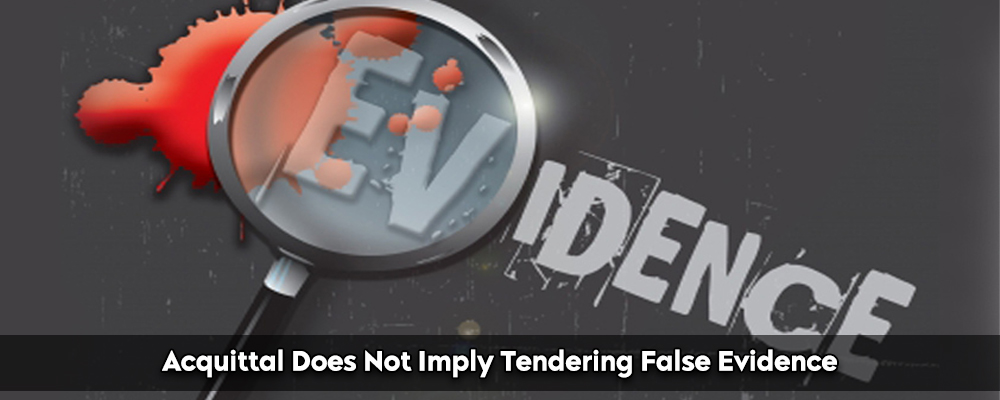Innocent until proven guilty is a cornerstone in the field of Criminal law. It is a fundamental principle of all just legal systems and is protected by numerous legal measures. One such law is Section 195 of the Indian Penal Code (IPC), which deals with situations where a defendant is acquitted in a criminal trial but does not automatically assume that the complainant tendered false evidence.
Need A Legal Advice
The internet is not a lawyer and neither are you. Talk to a real lawyer about your legal issue

Section 195: Indian Penal Code
- Section 195 of the IPC principally addresses offenses involving providing or producing false evidence. It stipulates that unless certain authorized persons file a complaint, no court may take notice of violations under Sections 193 to 196, Section 199, Section 200, and Sections 205 to 211 of the IPC. These authorized parties frequently consist of the court itself, the prosecutor, or the individual who was the target of the false evidence
- This section serves as a defense against baseless and annoying accusations that present fictitious proof. Before taking legal action against the accused source of false evidence, a specific complaint must be made by an authorized party. This suggests that there is no automatic assumption that false evidence was presented by the complainant when an accused person is simply found not guilty in a criminal proceeding.
Reasons Why Acquittal Does Not Imply Tendering False Evidence
An acquittal in a criminal proceeding is not an indication that the complainant tendered false evidence for a number of reasons-
- The presumption of innocence as long as proven guilty is the cornerstone of any just judicial system. A court’s decision to acquit a defendant means that the prosecution was unable to establish their guilt beyond a reasonable doubt. It does not necessarily follow that the complainant purposefully offered misleading evidence.
- There are frequently a number of complex criminal cases that might affect how a case turns out. Acquittals may be the consequence of problems with the strength of the evidence, the reliability of the witnesses, improper procedural steps, or legal nuances. These elements may not necessarily indicate that the complainant provided fraudulent evidence.
- Investigation or prosecution errors could lead to an acquittal. These mistakes could have occurred during the investigation or during the prosecution’s case presentation. These faults may involve improper handling of the evidence, misleading witnesses, or errors in the procedures. None of these mistakes specifically show that the complainant submitted fabricated evidence on purpose.
- The presumed existence of false evidence upon acquittal might encourage malicious prosecutions, in which those with personal vendettas could use the judicial system to harass or injure their opponents. Section 195 of IPC serves as a deterrent to such abuse.
- Presenting false evidence in the wake of acquittal may discourage potential witnesses from stepping forward and helping with inquiries. Witnesses can worry that, in the event of a subsequent acquittal, they’ll be charged with perjury or providing false evidence.
The legal system has procedures in place to deal with dishonest testimony or perjury. Allegations of fabricating evidence may be looked at individually, and offenders may face prosecution. This strategy makes sure that justice is done while upholding the rights of all parties.
Role of Judiciary: Punjab & Haryana High Court
- In Zile Singh v Joginder Singh and Ors case a single acquittal in a criminal case does not establish a presumption that the complainant provided false evidence.
- The Punjab and Haryana High Court highlighted how crucial it is to protect the idea of a fair trial and steer clear of malicious prosecutions. To preserve a cautious and impartial approach to justice, Section 195 of the IPC calls for a particular complaint by an authorized person before taking any action against accused false evidence suppliers.
The prosecution is responsible for demonstrating beyond a reasonable doubt that the complaint offered false evidence. This emphasizes the gravity of the accusations and guarantees that only those who are actually obstructed justice will be held accountable in court.
In circumstances of acquittal, complainants are not implicitly presumed to have presented false evidence, but they are also not exempt from responsibility. If it is established that a complainant knowingly offered false evidence, they may be held accountable in accordance with the relevant legal laws.
The rights of all parties participating in the justice system as a whole are protected by this fair approach, which guarantees that justice is done.One can talk to lawyer at Lead India for any kind of legal assistance. Free legal advice online can be achievable at Lead India. Along with obtaining free legal advice online, one can also ask questions to the experts online free from Lead India.





 Talk to a Lawyer
Talk to a Lawyer